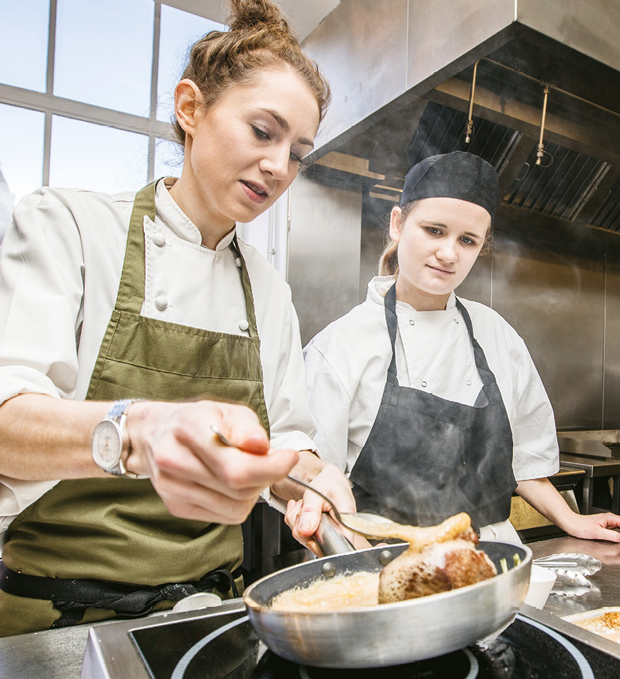SUSTAINABLE THINKING
Sustainability, from reducing waste to saving energy remains a key driver, but with food and drink price inflation in hospitality hitting 15 per cent for the first time in the history of the CGA Foodservice Price Index it is more essential than ever.
“Food waste is something we always monitor closely, as it’s a cost to the business,” says Harte. “As an industry we’re now much more tech savvy and new tech that came in during COVID, like ordering using apps, brings benefits in monitoring the flow of the day to manage waste and better understand the customer.”
He explains that with changed hybrid work patterns: “Many sites now offer a different type of service with a continual service of breakfast, lunch and afternoon, with different elements of the offering changing, rather than everything being cleaned down, which creates wastage.
“The energy crisis of course also effects our business, so the correct use of energy in the building, from the dining room to the kitchen must be reassessed. Encouraging chefs to be more sensible on how they use equipment is in itself an education and a training process. The first thing a chef used to do was turn everything on first thing in the morning which must be no longer the case, as old habits of having everything running constantly are so immense, from the costs to us, to the customer and to the environment.”
He reports that the move away from meat to more plant-based diets, means chefs have adapted their menus to include more vegetarian and vegan options, from salad bars to sandwiches going full circle back to the Chef Academy who run training to change the reliance on meat and fish as being the stars of the plate, instead introducing alternatives which appeal to all dietary preferences.
He adds: “With a decentralised supply chain, we source where possible locally, including fruit and veg and baked goods, seafood from the most local point and grocery coming in from a national provider.
“It’s the fresher items that tend to be local. That’s important for a number of reasons. We want to recruit the best chefs to come and work for us, and chefs like quality ingredients, fresh, not frozen. They want to be at the back door with the veg delivery, so to get the best chefs we give them that option and the story gets better if the supplier is local and someone the chef can talk to.
“If you put supply into a national structure and through a central ordering structure, the chef won’t stay and we support the local community so by going to the farmer there is a better cost option. And our customers like that we’ve got fresh produce with a positive farm to fork story.”
 A recent partnership with Waste Knot, which works to provide a new market for its growers by getting surplus veg out of farmers field and into chef’s kitchens, challenged BaxterStorey chefs to create innovative dishes from scratch using fresh, locally grown, seasonal ingredients. “Partnering with Waste Knot encourages our chefs to get creative and be inspired to explore new ways of cooking with all parts of the plant as well as completely new ingredients, reducing food waste and creating a more sustainable industry”.
A recent partnership with Waste Knot, which works to provide a new market for its growers by getting surplus veg out of farmers field and into chef’s kitchens, challenged BaxterStorey chefs to create innovative dishes from scratch using fresh, locally grown, seasonal ingredients. “Partnering with Waste Knot encourages our chefs to get creative and be inspired to explore new ways of cooking with all parts of the plant as well as completely new ingredients, reducing food waste and creating a more sustainable industry”.
FUTURE OF FOOD
As a trained chef Harte has the love of food which underpins any successful catering business and this he says was reflected in the company’s ‘Obsessed’ event which celebrated exceptional food experiences held at the Gherkin earlier this year.
“We love food and we love this sector so when the Obsessed event came up that name came out in a minute, as we’re obsessed by all those things that give us that energy. The event was to establish that we’re all still behind that philosophy of the business and to celebrate the young chefs and young baristas coming into the industry. It was a really lovely event to reinforce that what we do in the morning is get up and serve the customer. That is what this industry is about. It’s a simple thing, and about people feeling welcome, valued and can have a really nice experience.”
With so many organisations and their FMs still adjusting to a hybrid workforce Harte remains optimistic for the future, that while automated solutions such as vending or ‘unattended retail’ have gained credence in certain areas the value of the hospitality experience will endure.
“If you take away fresh food with people to serve it and replace it with automation I guarantee that is not a solution. I’d advise that you work with your catering suppliers, make sure the costs match the vision of what you want to spend and that will result in a quality service which engages and attracts your team members. Catering and food service are in a new world where it’s an added benefit more than it was before, especially in bringing employees back into the building.”





